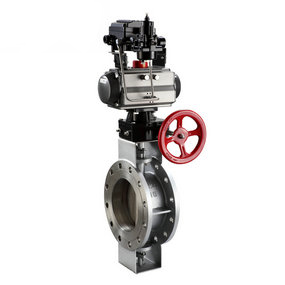How about the price of flanged pneumatic ball valve? What is the poor performance when the pneumatic butterfly valve is damaged
In the previous article, we introduced the use of pneumatic butterfly valves in vehicles. Pneumatic butterfly valves always fail and are damaged due to some factors. What are the manifestations of pneumatic butterfly valve damage in vehicles? What are the methods for judging the damage of pneumatic butterfly valve? Now let's understand what the poor performance is when the pneumatic butterfly valve is damaged and how to judge the failure!
What is the poor performance when the pneumatic butterfly valve is damaged?
1. When passing through potholes and undulating roads, the bouncing of body ripples increases, and sometimes the sound of metal collision comes from the front of the car.
2. When the car goes through a curve, the ball valve vibrates too much up and down, resulting in poor tire grip and tracking, which often leads to a lack of confidence in going through a curve.
3 Sometimes I can hear the sound of "clunk, clunk" coming from the head of the car. The number of vehicle vibrations increases. I think the car has no buffer and is not warm.
4. Due to the weakening or loss of the ability to absorb residual vibration, the vehicle is prone to alarm when slightly vibrated in a stationary state
Judgment method for failure and damage of pneumatic butterfly valve:
1. How to judge the reliability of the pneumatic butterfly valve at the rear of the vehicle: put the vehicle on a flat place, press down the trunk with your hand (the trunk cover of a tall SUV also stops when it is turned over), and then release it. It is normal for the vehicle to stop after maintaining 2-3 jumps and rebounds.
2. Judgment method for pneumatic butterfly valve at the rear of the vehicle: put the vehicle on a flat place, press the bumper forcefully (press the front part of the vehicle also works), and then release it. If the vehicle bounces back 2 to 3 times, it indicates that the pneumatic butterfly valve works well.
3 When driving at a low speed, brake suddenly. If the car shakes violently and the human body feels uncomfortable, then the pneumatic butterfly valve is very likely to be damaged.
4. The car stops after driving about 10km on the road with poor road conditions, touch the shell of the pneumatic butterfly valve with your hand. If you feel that the shell temperature does not have a certain amount of heat, or it is constantly cold, it indicates that there is no resistance inside the pneumatic butterfly valve, and the pneumatic butterfly valve does not work properly.
5. Lift the vehicle or turn the wheels to check the appearance of the shock absorber. If there is obvious oil stain (usually more than 1/2 of the total length), suggest changing it.
6. Break off the dust cover of the pneumatic butterfly valve. If the rubber cover of the buffer block is damaged, the pneumatic butterfly valve is also severely impacted in most cases and is damaged or badly affected.
The pneumatic butterfly valve of the vehicle is damaged. We can judge the damage of the pneumatic butterfly valve by pressing the bumper of the car! How to check after disassembly? Push and pull the pneumatic butterfly valve tappet by hand for 5-8 times when the shock absorber is relaxed; The shock absorber can extend automatically, and the damping force of the pneumatic butterfly valve can be judged by 2-3 times of pushing and pulling. If the shock absorber can extend naturally and has proper damping force, it indicates that the shock absorber is normal.


